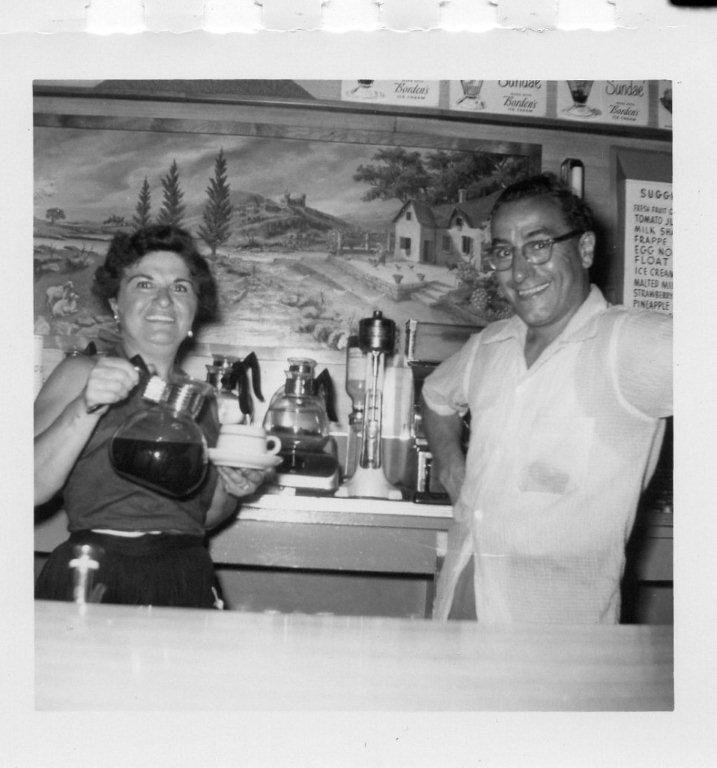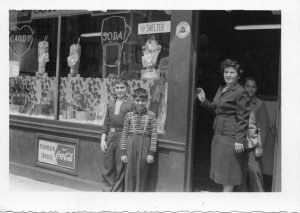Growing up, much of my time was spent in Dad’s coffee shop tending to business. If I wasn’t there, you’d find me hanging out at the corner drug store by the soda fountain whistling at the girls as they walked by.
I bought my penny candy from the variety store beneath by home. And grocery shopping was done in an Albanian market around the corner. Good place, too. If you didn’t have the money one week, they’d put it on your tab.
Back then we were a neighborhood of immigrants. One helped the other, whether they were of different extraction or your own kind. The doors were always open. The courtesy was overwhelming. And the spoken language represented a League of Nations.

My folks bought their luncheonette in 1940—the year I was born and a couple years after they had wed. The place adjoined a movie theater, one of seven in Somerville at that time. What an arrangement we had with the management! Free movie tickets for complimentary meals. I don’t think I ever missed a flick during the 1940’s and 1950’s through high school.
You do not want to play against me in a trivia contest, especially when the subject is films.
Our coffee shop came with all the nostalgia of that generation. The nickelodeon always got its workout. There was a pinball machine that couldn’t be ignored. The candy counter was my responsibility and that of my kid brother, Setrag. We both ate the profits.

Mom and Dad handled the food counter. It was seven days a week for years before they finally took a day off. It was a place where the locals hung out over their coffee mugs and the kids from high school patronized over an ice cream soda. You could call it an institution because that’s what it was.
Two Armenian Genocide survivors selling coffee and donuts to Irish and Italian immigrants and hearing how the stories paralleled one another. It paid the bills and taught us human relations, business sense, and resourcefulness.
When Dad passed, along with him went the IOUs he had accumulated in his cash register. In all the years he walked from the store to our house a mile away—with the day’s receipts in his pocket—not once was he ever assaulted.
In order to get home, he would have passed the Winter Hill Gang where Billy Bulger hung out. Whether he paid for protection or not remains to be seen.
Then, one day, a White Hen Pantry moved on the corner and business became competitive. First one store, then another. If they were selling ice cream sundaes for a quarter, you dropped your price to 20 cents.
Suddenly, the regulars had a choice where to dine. The corner grocery store was now being assaulted by a First National. One by one, the movie theaters disappeared and on came the showcase cinemas. The drive-ins we patronized on a Friday night became their own relics of destiny.
I grew to love the place, much as I hated being there. The people became attached to you, even the sawdust that covered the floor, and the loiterers who hung around on a 5-cent cola. It put my brother and I through college, because we were part of the working staff.
Politicians converged here. Athletes made their way after the big Tech Tournament game at Boston Garden. First Communicants joined their parents. Every vagabond in sight barged in looking for a handout. The blind, the deaf, wiggling their canisters. Veterans ate free.
Mom was the softie of the two. A stickler for education, just show your report card and if your grades were honorable, help yourself to the candy counter. Many went to college on a sweet tooth.
As I dwell about it today, a thought just occurred to me. This column would not be coming to you if it were not for the store. Neither would a lot of others I have written and espoused. If we can’t draw upon our memories from time to time, we’d be depriving ourselves.
Bury the past? I think not. If only those good old days could return for one brief moment to see life the way it truly was back then—simple, uninhibited, and mellow. They would not be so old if more people relived them.
Today, there’s a doctor’s office where the coffee shop once stood. A housing complex has replaced the neighborhood market. The movie theater has its remnants inside the historical museum.
“What’s that you’re holding, Papa?”
“A record. We played this in a machine and got our music. It’s made of vinyl.”
“What’s vinyl?”
“You’re too young to understand, grandson.”


Thanks for this article I too spent a few years growing in such a ma and pa community and it was never forgotten